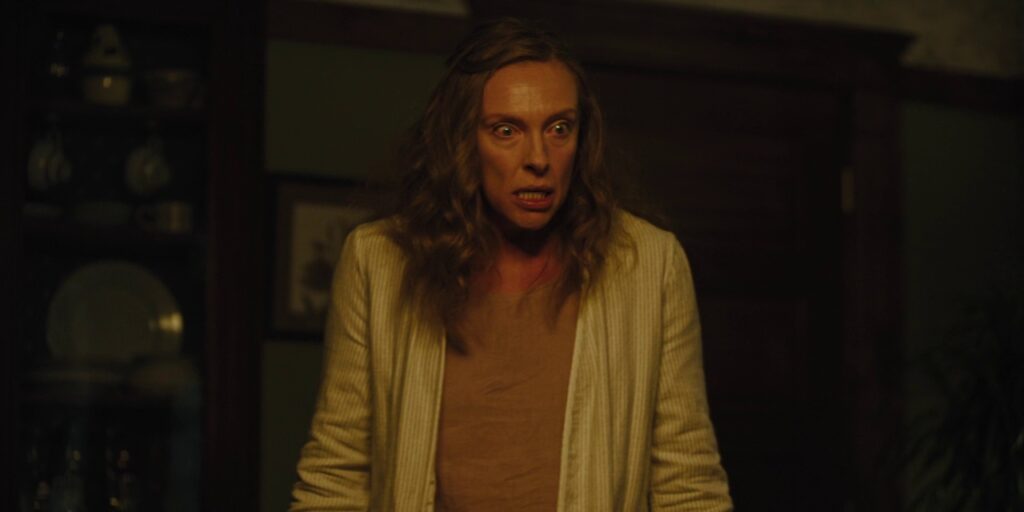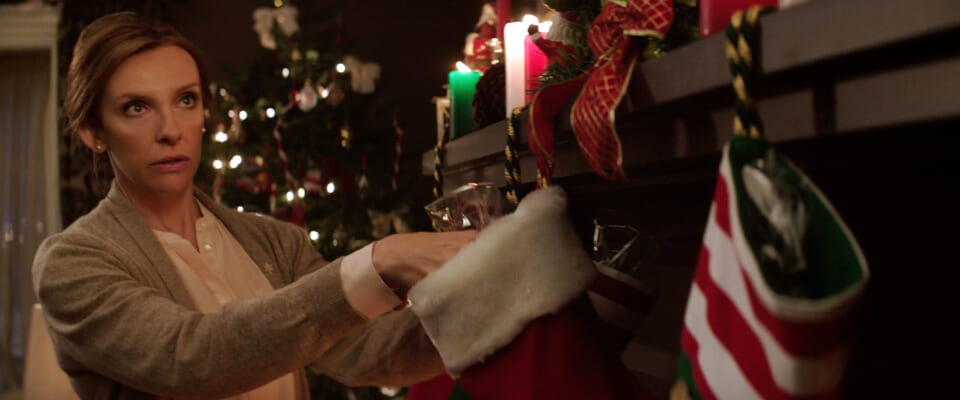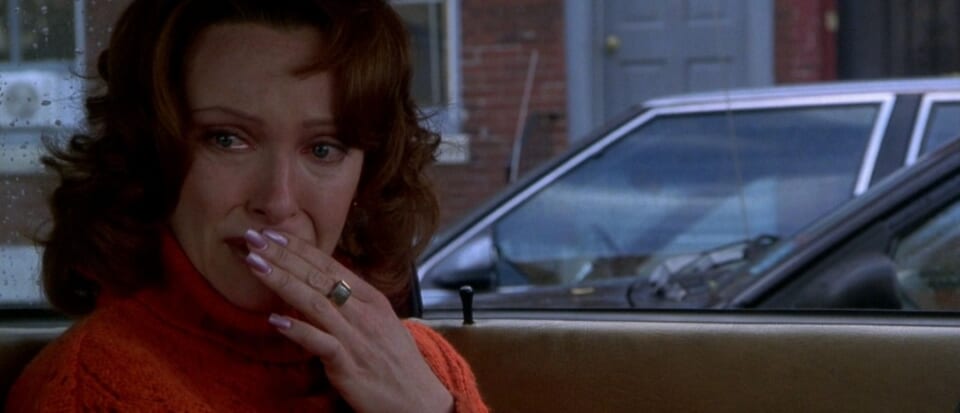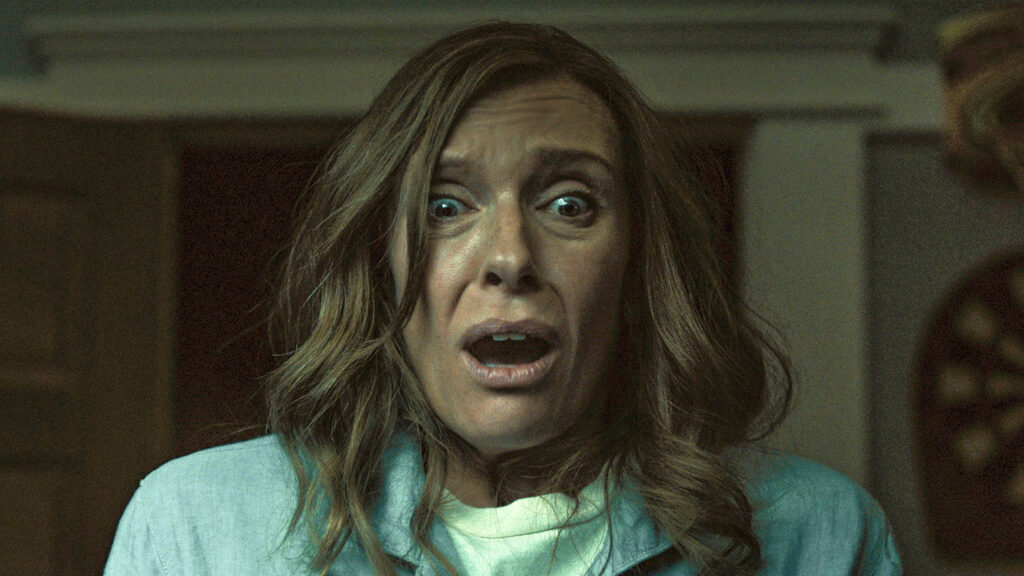I Am Your Mother: Toni Collette Is Horror’s Matriarchal Queen

It feels like a bit of an understatement to call Toni Collette a Scream Queen. The Australian actress has worked in all genres, but she’s particularly beloved by the horror community. Collette specializes in playing mothers. The jaw-dropping dinner table monologue in Ari Aster’s Hereditary is a prime example of her skill in depicting maternal horror and left many fans outraged that she wasn’t nominated for an Oscar. Of Collette’s most celebrated roles, three are mothers trying to survive terrifying situations while caring for their children. In addition to Hereditary, Collette plays mothers in M. Night Shyamalan’s breakout film The Sixth Sense and Michael Dougherty’s holiday hit Krampus.
These characters couldn’t be more different. But Collette brings an honesty and vulnerability to all three mothers adding humanity to an archetype often oversimplified. All three women love their children, but they also have lives of their own. Their approaches to motherhood show that they are human beings as well as caregivers for troubled sons.
Hereditary (2018)

Aside from a deliciously snarky turn in Knives Out, Toni Collette’s most notable recent film is Hereditary, a devastating and dark story of a family destroyed by a demonic cult. Collette plays Annie Graham, a mother of two teenagers whose traumatic past interferes with her ability to connect with others. She works as a miniaturist, an art that allows her to isolate herself in her home studio and also minimize her trauma in elaborate, but tiny scenes.
The film begins with the funeral of Annie’s own mother and we learn that the two had a strained relationship. One of Annie’s pieces shows the two women in bed as Annie tries to nurse her baby. Rather than help, it seems as if Annie’s mother is trying to control or even replace her in the role. In a devastating monologue, we learn that Annie’s brother died by suicide as a teenager claiming his mother was trying to put people into his body. As it turns out, this fear was accurate. Annie’s mother belonged to a demonic cult dedicated to raising Paimon, one of the nine kings of Hell, to walk the earth. There are many more complexities to this plan, but the cult succeeds. This leads to the horrific death of Annie’s daughter Charlie (Milly Shapiro) and instills Paimon in the body of her son Peter (Alex Wolff).
Though Annie seems devoted to Charlie, her relationship with the elder Peter is strained. Due to the trauma of her upbringing or perhaps sensing what her mother had planned for the baby, Annie was understandably hesitant to have a child. One night while sleepwalking, she admits to Peter that she never wanted to be his mother and did everything she could to stop the pregnancy. She blurts this out, then seems shocked at the words she hears herself saying. It’s not that she’s never thought them before. But she knows the consequences of saying them out loud.
This devastating sentence is one of the most upsetting moments of the film. But it’s also powerful in its brutal honesty. Most mothers, if they’re honest with themselves, have had moments of doubt about their decision to have a child. Birthing and caring for children is incredibly difficult. Everything changes in the blink of an eye and we’re expected to joyfully accept the loss of our former selves while giving every ounce of mental and physical energy to a tiny human incapable of giving it back. We love our children. But many of us grow to resent the burden of caregiving and the taboo of admitting this causes us to hide those feelings deep within ourselves. Hearing Annie say these horrible words we’ve trained ourselves never to say is an incredible validation of feelings we’re too scared or ashamed to acknowledge.
Annie has an earlier argument with her son at an incredibly intense dinner scene. Shortly after Charlie’s death, an accident for which Peter is indirectly responsible, Annie finds herself enraged at her son. She screams at him essentially blaming him for the accident. With Charlie’s death easy to pin on Peter, she now has a channel for the frustration she’s been repressing for 17 years. Annie’s fury truly ignites when Peter points out her own part in Charlie’s death, reflecting her inadequacies as a mother back at her.
Though it feels shocking to hear mother and son attack each other with their fury and sorrow, these are all valid emotions that will only grow more toxic the longer they’re repressed. By getting them out in the open, Peter and Annie can make an honest connection in their grief even if it’s painful, an essential step on the path to healing.
I’d like to think that if a cult weren’t targeting Annie and her family, they might be able to mend their relationship. Maybe with all of the ugliness, blame, and resentment out into the air, they could finally learn to forgive and support each other. That’s unfortunately not how the Graham family’s story ends. But Annie’s brutal honesty feels brave and can hopefully inspire the rest of us to say the hard truths out loud even when it hurts to hear them.
Krampus (2015)

Toni Collette plays a mother under a different type of stress in the 2015 Christmas horror film Krampus. As Sarah Engel, she’s a wife and mother tasked with holding the family together while her husband Tom (Adam Scott) frequently travels for work. Sarah becomes obsessed with creating the picture-perfect Christmas for her family. She decks out her home in stylish decor, causing her Aunt Dorothy (Conchata Ferrell) to note, “it looks like Martha Stewart threw up in here,” and bakes elaborate meals when all her family wants is traditional comfort food.
Her son Max (Emjay Anthony) notes in his letter to Santa that he thinks his parents simply miss each other. Perhaps this quest for perfection is an attempt to encourage Tom to spend more time at home. It’s as if she’s trying to compensate for the lack of love she feels in her marriage by filling it with the image of a perfect Christmas. Or maybe she’s trying to create a perfect memory to cling to when Tom inevitably goes out of town again.
Sarah’s “perfect” life stands in sharp contrast to her sister Linda (Allison Tolman)’s messy family when they invade the Engel house for Christmas. Perhaps feeling like Sarah is looking down on them, they constantly complain about everything she’s created and it seems her quest for perfection is shining a light on their own flaws. The pressure Sarah feels to please everyone is one many mothers feel, especially around the holidays. Enjoying “the most wonderful time of the year” often comes with the burden of cooking, shopping, cleaning, and decorating to create a pleasing space for everyone else to relax. The amount of effort it takes to create these memories of Christmas often overshadows the joy of actually experiencing them.
The holiday soon begins to unravel as Sarah and her family are attacked by Krampus and his helpers. Monstrous versions of traditional Christmas symbols pick each member of the family off one by one. A sinister snowman guards the house, murderous gingerbread men attack from the kitchen, and a horrific Jack in the Box unhinges its jaw and swallows one of the children. As the horror unfolds, Sarah and her family grow closer. They forget to try to be perfect and simply try to survive. Once the facade of an idealized holiday is no longer an option, they’re able to truly see each other and remember how much they have in common. Annie and Tom reconnect through the battle to save their family and it seems they’ve finally found an imperfect kind of peace.
Krampus ends on an ambiguous note and the final scene could be read as a sign that Max and his family are doomed to spend eternity trapped in one of the monster’s nightmarish snow globes. But I choose to read it as hopeful. The bell Max opens could simply serve as a reminder of the lessons they’ve learned through their terrifying ordeal.
The Sixth Sense (2015)

Toni Collette made her first big splash in the horror genre with the game-changing shocker The Sixth Sense. Lynn Sear is a single mother working two jobs and trying to support her troubled son, Cole (Haley Joel Osment). As the film’s title implies, Cole has the ability to see dead people who hurt, scare, and harass him. This sixth sense causes other kids to ostracize him and he’s afraid to tell his mother about the things he sees. Everyone else calls him a freak and he’s worried that if Lynn knew the truth, she would, too. But Lynn knows something is wrong and can’t figure out how to help her lonely son.
Raising a child with an unexplained illness, real or supernatural, can be incredibly hard. Lynn is constantly worried about her son and powerless to help him. The attacks are happening inside her own home and she feels like a failure for not being able to protect him. Totally on her own, she longs for support from her own mother who passed away years ago.
When most people think of The Sixth Sense, they remember its legendary twist ending. But another scene may be even more powerful. Having finally learned to somewhat manage his gift, Cole is finally ready to tell Lynn his secret. While stuck in traffic, he tells his mother he’s been visited by his Gramma. He reveals her answer to a question Lynn asked at her mother’s grave: “do I make you proud?” Cole gives Lynn the message that she makes her mother proud, “every day,” bringing tears to her eyes along with everyone in the audience. Lynn finally has assurance that she’s not the bad mother and daughter she believes herself to be. With the truth finally out in the open, she and Cole sob together in the car, crying painful but healing tears that have finally brought them closer together.

In each film, Toni Collette plays a mother determined to help her son while struggling with problems of her own. Annie’s repressed trauma keeps her from connecting with her family. Sarah tries so hard to create the perfect Christmas that she ends up driving her loved ones away. Lynn struggles to raise an exceptional child while grieving for her own mother. The endings to these stories differ wildly, but they all have one thing in common: each film includes a scene in which a hidden truth is finally revealed. Each mother is confronted with a painful reality and finds strength in facing the truth. Annie, Sarah, and Lynn provide cathartic validation for every mother secretly afraid that she’s failing her family.
By watching Toni Collette abandon her need for maternal perfection, we find the strength to accept our own flaws and mistakes. She may be a mom to Peter, Charlie, Max, and Cole on screen. But in her stunning portrayal of a horrific matriarch, Toni Collette becomes a spiritual mother to us all.
Categorized:News

